
CLOS deSanjuan

Intense, spicy and powerful
GRAPE VARIETY
Bobal
APPELLATION
DOP Utiel-Requena
VINEYARD
60-80 ans years old bush vines, non irrigated
ALTITUDE
700-750m
soils
Clayey-chalky
harvest
By hand
winemaking
Fermented and aged for 10 months in raw concrete tanks. Aged for 15 months in oak French barrels of 500 litres.
*Tasting Notes
COLOR
Intense garnet and dark red with purple glints purple.
AROMA
Intense on the nose, with hints of red fruits combined with spicy and balsamic nuances of black pepper and liquorice, together with the subtle toasted notes of its ageing in oak barrels.
TASTE
Powerful attack in the mouth, showing structure and character. Spicy and sweet flavours of black and red fruits, fresh acidity and tasty tannins which give a long and persistent finish.

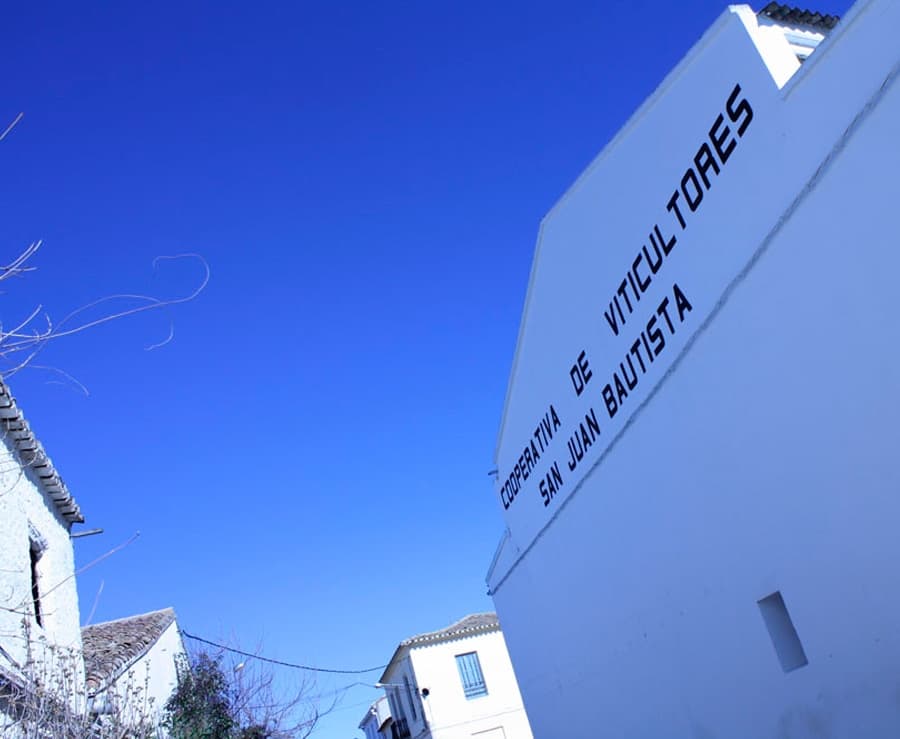
Recovery of the territory
RECOVERY OF THE TERRITORY AND ETHICAL COMMITMENT
Recovery of the territory with the purchase of the old cooperative winery of the village of San Juan, in the heart of Utiel-Requena region, rehabilitating the facilities in full respect of its uniqueness.
The Viticultores de SanJuan winery was built in the 1950s by the village farmers themselves, with their own hands. We, the Valsangiacomo family, with experience as winemakers since 1831, acquired it in 2008. We began the rehabilitation of the facilities, respecting the original structure, with the aim of recovering a rural territory that is threatened by depopulation, in our mission to rescue vineyards and recover native grape varieties such as Bobal.
We understand viticulture as a whole: not only a good work in the vineyards and in the winery, but also as a set of ethical and sustainable practices with the environment and with people, from the respect for the land to decent conditions for the people who make a living from it.
The philosophy is clear: a winery for a single grape variety, the Bobal. Small-plot vineyards wines, singular wines, pure wines, without make-up, based on the strength and singularity of old vines that are well worked in concrete tanks, as they were 100 years ago. These are still modern wines, all in all, capable of enchanting the non-understander and the wine critic at the same time. We craft wines that are pleasure.
We take great pride and conviction in our long-term commitment to sustainable development objectives: from reducing the environmental impact of our activity as much as possible, to choosing our suppliers, to investing in renewable energies and the organic certification of our vineyards.
Beyond the desire to produce good wines from the native Bobal grape, our mission is to protect, restore and promote practices that respect the ecosystem and that we will proudly pass on to the sixth generation of the Valsangiacomo family when the time comes.

The value of cement
THE VALUE OF CEMENT
We make our wine as it was made 100 years ago. Fermentation and ageing take place in raw concrete tanks.
Fermentation and ageing in uncovered raw cement tanks -without any kind of interior coating- gives the wines a better structure and ensures a good evolution in the bottle, keeping all the aromas coming from the grapes and reflecting the terroir.
We have 70 raw concrete tanks with a layer of ceramic tiles at the base (recovered from the farmers’ own houses with which they used to decorate their kitchens and bathrooms), integrated into the construction of the winery.
Raw cement is a porous material that favours the micro-oxygenation of the wine. The tannins are polished and become round and fine, both during fermentation and storage. The walls of the tanks, which are about 50 cm thick, also act as a thermal insulator. In addition to softening the natural astringency, these tanks allow for natural decanting, preventing aggressive filtration. The result is fine wines with great harmony, with great fruity power and balance, and a long aftertaste.
Raw cement also increases the longevity of the wine, respecting its personality as much as possible, unlike stainless steel tanks which are impermeable to oxygen.
It is a return to the origins, an agriculture in its purest state, with practically no use of steel, with materials that fully respect the expression of a land through its grapes.
A wine made in the most natural way possible, taking advantage of the many other qualities that our environment offers us.
Incalculable value
THE INCALCULABLE VALUE OF OUR ENVIRONMENT
High altitude wines, old vines and sustainable growing.
To craft our high altitude wines, at Viticultores de San Juan we apply sustainable viticulture, helped by the favourable qualities of the environment, which allow us to cultivate healthier vines, respecting their natural cycles, with the least possible intervention.
The vineyards are located on the inland plateau of Valencia, 70 km from the Mediterranean coast, in the heart of the Utiel-Requena appellation, between 700 and 850 metres above sea level. The area has a Mediterranean climate with continental features: a wide temperature range between day and night, long, cold winters with temperatures that can reach 15ºC below zero, and hot, dry summers. The average annual rainfall is low, around 350-400 litres per year.
The east wind called Solano brings a Mediterranean touch to our Bobal: the vines are swayed by this “wind of the sun”, a climate enhancer, which accentuates the difference between daytime and nighttime temperatures and provides the perfect balance between humidity and dryness.
These specific climatic conditions of the area provide the natural resistance of the Bobal grape variety, so the use of synthetic phytosanitary products is practically non-existent. The sunshine and wind naturally protect the grapes from diseases, allowing us to use fewer treatments than even those permitted by the organic wine legislation itself.
The soil of our vineyards contains mainly clay and limestone, but depending on the location, it contains a higher percentage of clay or sand with alluvial stones (from the Magro river).
All these conditions produce a slow ripening of the grapes and therefore fresher and more aromatic wines.
El Albardín estate
PARCELLE EL ALBARDÍN
Harmony, respect for the land and biodiversity in a living landscape.
Owned by the Valsangiacomo family, the hundred-year-old vineyards of the Albardín estate, which are certified organic, show exceptional soil, genetic and climatological conditions. We respect the land and biodiversity in a landscape that we strive to keep alive. Respect for our environment involves recovering and promoting biodiversity, from ground cover to biological plagues control using pheromones and by planting aromatic plants whose flowers attract pollinators.
El Albardín estate meets the ideal characteristics for making expressive, unique and elegant wines that are at the same time easy to drink.
The goblet-pruned and dry-farmed Bobal grapes, respected and well-crafted both in the vineyard and at the cellar, give the wines personality, character and expressiveness.
Beyond trying to tame the Bobal, a grape that is difficult to domesticate, our task is to interpret it through the different plot selections we make. The same estate has different characteristics that allow us to add more parameters of complexity to our wines: variety of soils, microclimates, old vines (up to 100 years old) and low yields (the oldest vineyard can reach barely 200 grams per vine).
We practice spontaneous and inter-row ground cover. This favours biodiversity in the vineyard, increasing, for example, insects or earthworms, which in some cases can regulate certain plagues that cause considerable damage to grapes (mainly grapevine moth). To increase this biodiversity, we grow aromatic plants (rosemary and lavender) in some areas where the planting pattern is wider. Occasionally, different aromatic plants appear spontaneously (e.g. bitter camomile). These are particularly important because they are perennial and produce flowers that are attractive to pollinating insects.
This living landscape, made up of insectivorous birds, birds of prey, wild boar, snakes, lizards, partridges and a myriad of other animal and vegetal species, find their ideal habitat in this agro-ecosystem.
Another reason for using cover crops is that where vines grow more and produce much more grapes because there is more water available, there is also more ground cover, generating more competition and reducing the vigour of the vines, thus producing fewer and better quality grapes.
One grape, one cellar
ONE GRAPE, ONE CELLAR
To stay fully local, only the Bobal grape enters the winery. No other grape variety enters the winery.
At Viticultores de San Juan, we decided to continue our commitment to Bobal, the second most produced grape variety in Spain, and which, unlike other varieties, is not cultivated anywhere else in the world outside Utiel-Requena and Manchuela regions.
The plant is vigorous with strong, long shoots. It tends to creep, thus helping to protect the grapes from direct sunlight during the sunniest months. Adapted to the local climate, it is very resistant to our extreme temperatures, both in summer and winter.
The average cluster is large, elongated, compact and irregularly conical in shape. The size of the berries and the tightness of the bunches is one of the major drawbacks that hinder the homogeneous ripening of the grapes, so the viticultural work and the selection of the plots are focused on the distribution of the vigour in the plant, the reduction and improvement of the size of the bunches to obtain adequate polyphenolic ripening without incurring in over-ripening, seeking the fresh and aromatic profile of the wines.
The grape has a meaty pinkish flesh and a dark purplish skin. When ripe, the berry has an original and fragrant aroma of red fruits, an intense flavour and a balanced acidity.

